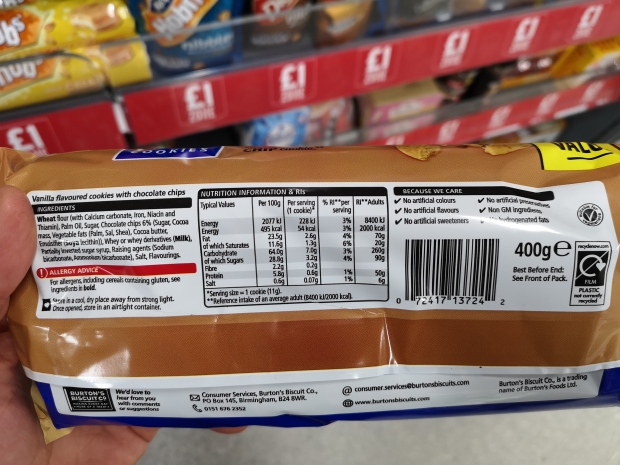Why we have an obesity problem Part #2

A while back I posted Why we have an obesity problem.
If that was Part #1, this is Part #2.
I was visiting my local Post Office the other day. It’s a busy little sub-Post Office counter built at the back of a neighbourhood convenience store, as many Post Office counters are these days. It’s almost always busy, and customers form a queue along one of the aisles of the shop. Here is the view as I stood in the aisle awaiting my turn to be served.

Great, ‘the £1 zone’ is right there, where folks who just want to post a parcel or buy some stamps or apply for a drivers licence, have to stand and wait to be served.
I grabbed a packet of cookies and turned them over to see the nutrition label.
Check this out:

This twin-pack of ‘vanilla flavoured cookies with chocolate chips’ weighs 400 grams net weight. As you can see, the cookies deliver 495 calories per 100g. In round numbers, this is 2000 calories – for £1. (For my readers outside the UK, at current rates, £1 sterling is €1.14 Euros, or $1.29 USD at current, Feb 2019, exchange rates.)
2000 calories is the recommended daily intake for an adult female in the UK, wishing to maintain body weight (not gain or lose).
2000 calories, your entire daily intake, for £1.
Let’s just check the ingredients label to see what these cookies are made of.

Now, remember the way an ingredients list works – the items are listed in descending order, from the item that makes up the greatest percentage of the contents, down to the minor items listed last.
These cookies are made of – refined wheat flour, palm oil, sugar, chocolate chips (which are made of sugar and more palm oil) and then some coca butter and then lesser items.
Broken out by macronutrient, the 2000 calories in this £1 pack consist of:
- Just over 50% sugar – 262 calories of carbs out of 495 calories per 100g. (Carbohydrates contain around 4.1 calories per gram.) They list “of which sugars” as a sub-set of the carbohydrate, but given that the ‘non-sugar’ is just refined wheat flour, once inside your intestines it is broken down and absorbed as glucose just the same as the refined sugar, so to your blood, to your metabolism, it’s all sugar. Out of 2000 calories – approx 1060 calories of sugar
- After the flour and refined sugar, the only other substantial ingredient is the palm oil (not the best thing to be eating) which contribute the overwhelming majority of the calories from fats in this product. (Fats contain around 9 calories per gram.) SO we get around 212 calories of fat (palm oil) per 100g. Approximately 43% of this product is fat
- Out of the total 2000 calories in the pack…it’s 53% sugar, and 43% fat – and that fat is not a healthy fat like you get in fresh fish, olive oil or avocado, that’s fat from palm oil
- As for this ‘food product’ providing any possible health benefits…like vitamins, minerals, essential amino acids…forget it
We have an obesity problem in this country, and that problem is a burden that is unfairly heaped onto low income families, and this is a big part of what is causing that problem. Crap food, refined sugar, refined plant oils, and cheap processed grains, are everywhere – cheap food, easy to buy, in our faces, tempting, tasty, packed and displayed to make our kids nag and pester for it.
While 90% of people I meet say they “can’t afford to buy organic” fruits and vegetables, but convenience stores are punting 2000 calories of sugar and fat for just £1, we are never going to solve the problem.
Public Health England needs to sort this out. Food manufacturers and mass market retailers are one of the most potent forces driving the obesity problem in the UK, and there can be no doubt that the abundant availability of cheap sugar is also exacerbating the type-2 diabetes problem too. This puts an increasing burden of poor health on to poorer families – the government should be subsidising bloody fish and vegetables, and taxing the hell out of sugar and palm oil. Clearly, with 2000 calories on sale for £1 (how do they even do that? The cost of overheads, the packaging, the shelf space, the store staff???) this is not happening, and we have a food system that enabled unscrupulous manufacturers and retailers to dump a mass of cheap, health-damaging ‘food products’ on to the market without any sugar taxes or other barriers to stop them.
Shame on you Public Health England.
Shame on you UK govt.
Shame on you food manufacturers.
Shame on you major food retailers.
Shame on all of you. Our NHS cannot afford to treat this burden forever. We have to rebuild a country that understands ‘prevention is better than cure’.





